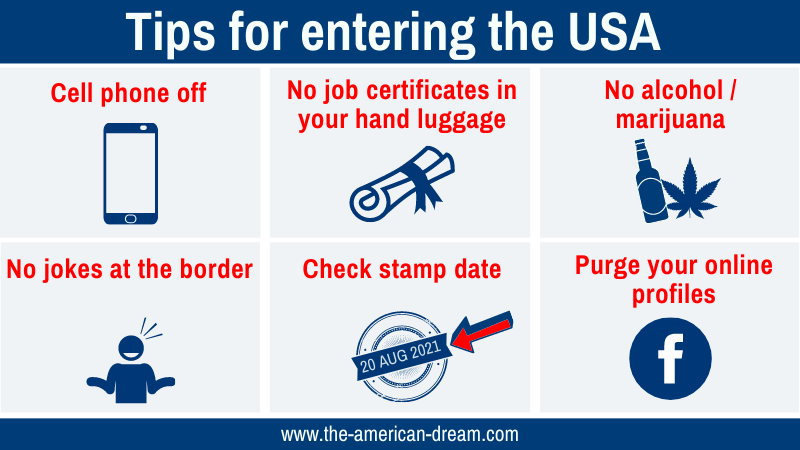US entry denied: reasons and measures
The US border is one of the toughest in the world. In a typical year, more than 270,000 travelers are denied entry for various reasons. Learn about the main causes for US entry refusal and how to avoid it when traveling to the USA.
- What is U.S. Customs and Border Protection?
- Who decides on my entry to the USA?
- How are US entry refusal decisions made?
- Top 10 reasons for US entry refusal
- 1. Your Criminal record
- 2. Illegal work in the USA
- 3. Medical Problems
- 4. Missing evidence, test results, or vaccinations
- 5. Travel Bans for your country
- 6. Suspicious social media content
- 7. Suspicious content on your devices
- 8. Lying in your ESTA or VISA application
- 9. Lying to a border official (or other bad behavior)
- 10. Missing documents at the border
- US Entry Denied: What Now?
- Prevent mistakes when entering the USA
Take the chance of living in the USA and apply for the official US Green Card Lottery!
What is U.S. Customs and Border Protection?
U.S. Customs and Border Protection (CBP) is America’s largest law enforcement agency responsible for securing the nation's borders and helping international travel. At more than 300 ports of entry, the officers’ mission is to screen incoming visitors.
On a typical day, CBP processes about 1.13 million passengers by air, sea, and land . However, more than 700 people are denied entry each day.
Who decides on my entry to the USA?
At the United States border, US immigration officers alone decide whether to allow or deny entry to travelers. Sometimes denial is clear-cut, such as a prior criminal conviction or the submission of incorrect documents.
Very often, however, no specific reasons are given and denied US travelers just have to guess.
How are US entry refusal decisions made?
Aside from court records, police records, and documents provided, US border patrol agents often rely on gut instinct. Therefore, it is difficult to predict the day-to-day reasons for being denied US entry.
The evaluation criteria of the border officials also differ depending on the traveler’s status. Whether you are traveling with ESTA, a US visa, a Green Card, or as a US citizen has a huge influence on the US customs officer’s choices.
However, it is possible to give a rough overview of standard decision criteria that you should pay special attention to before your trip.

No more entry refusal
Green Card holders ("Permanent Residents") have it easiest when entering the USA. However, getting the US immigrant visa is not a simple task. For most people, the only way is through the US government's Green Card Lottery, where 50,000 Permanent Resident Cards are given away each year.
Top 10 reasons for US entry refusal
We have collected the most common reasons for a denial of entry to the United States for you. Keep them in mind and prepare yourself:
What can you do?
Individuals found to be inadmissible to the United States may apply to the Department of Homeland Security (DHS) for a waiver. If this “United States Waiver” is approved by DHS, individuals may obtain a US visa to enter the United States.
2. Illegal work in the USA
According to the Department of Homeland Security’s website, you will most likely be denied entry to the US if you have worked illegally in the States in the past. However, you might also be suspected of planning to take up employment in the USA illegally out of the blue.
The reasons for such suspicion are complex. For example, carrying translated work certificates from your home country while trying to enter the USA on a B visa could arouse suspicion among border officials.
What can you do?
Purge your carry-on luggage on a USA trip of work references or other documents that might indicate a job search, housing search, or other immigration steps.
3. Medical Problems
There are various medical conditions under which you may be found unfit to enter the United States. These may include, for example, an alcohol-related illness.
Therefore, parts of your criminal history, such as frequent driving under the influence of alcohol, can play a role in the decision. Also, your appearance or carrying prescription drugs may lead the officers to decide not to let you cross the border.
In rare cases, border officials assume a traveler becomes a financial burden to the United States due to a pre-existing medical condition and therefore deny them US entry.
Other medical reasons may include a contagious disease, lack of vaccinations, an apparent physical or mental disorder, or obvious or recorded substance abuse.
What can you do?
In some cases, presenting medical insurance can help get your entry approved. Also, there is an option to take a medical test so that the officials will allow you to enter the United States.
If you are carrying many medications, but you won't need them during your flight, it's better not to stow them in your carry-on luggage.
4. Missing evidence, test results, or vaccinations
If you do not follow the entry requirements for the USA, you will usually get a ban before you even board a plane or ship. Especially in times of crisis, you need to be extra careful. There may be temporary restrictions or particular spontaneous requirements for entry into the United States.
What can you do?
Follow the guidelines on current travel rules on www.esta-application.com. The USA reserves the right to review these rules on an ongoing basis.
5. Travel Bans for your country
US travel bans can be imposed on travelers from certain countries for many reasons. Former President Donald Trump, for example, issued the so-called "Muslim Ban," under which nationals of certain nations were not allowed to enter the United States.
The USA reserves the right to review existing travel restrictions on an ongoing basis.
What can you do?
To find out if your country is affected by an entry restriction, visit the websites of the US Visa Service.
If you are affected by an entry restriction, you may have the opportunity to apply for a National Interest Exception under certain circumstances. However, the only way to avoid being affected by Travel Bans in the future is to obtain a Green Card.
6. Suspicious social media content
In the age of social media, it's easy to make thoughtless remarks available to a large audience. Not only does this often lead to the so-called shitstorms, but it can truly get you into trouble when you want to enter the US.
What can you do?
Before traveling to the United States, make sure to clean all your social media feeds and check all public posts and comments you have made on the internet.
The easiest way is to google your name and check the findings against the ten criteria for denial of entry to the USA. If something you've said or written could make for a false suspicion, delete it.
7. Suspicious content on your devices
If border officials demand passwords from you, they are doing something illegal. However, there are regular reports of travelers having to unlock and temporarily hand over their smartphones and computers. In 2019, for example, CBP searched 30,000 travelers' devices.
More and more often, travelers are being denied entry to the USA as border officials hold them accountable for the content sent to their smartphones by other people.

Be prepared for a check of your electronic devices when entering the USA
These are often messages sent by friends, family members, or even strangers, with content (e.g., pictures or videos) downloaded to the traveler's phone via social media sites such as Facebook, Twitter, and WhatsApp.
What can you do?
Before traveling to the United States, make sure to clean all galleries on your devices. Also, look for hidden folders that may hold automatically downloaded content you don’t even know about.
8. Lying in your ESTA or VISA application
If you demonstrably provide false or misleading information in your ESTA or Visa application, it will lead to a US entry denial. Also, intentionally providing false information can result in criminal charges and permanent entry bans.
What can you do?
Always stick to the truth and make sure there are no mistakes or missing details in your ESTA or US visa application. To be on the safe side, seek the help of an expert such as The American Dream's ESTA or VISA service.
9. Lying to a border official (or other bad behavior)
Officials at the American border really can't take a joke and are tasked with immediately sorting out anyone who is even slightly suspicious.
Therefore, the smallest deviation from the truth in the short entry interview or the second security check ("SSSS" or Secondary Security Screening Selection) for selected passengers can lead to an entry ban for the USA.
It has often happened to good-humored jokers who just wanted to lighten the mood in a grim interview situation.
What can you do?
While being questioned by US border officials, be brief, be serious, and tell the truth. If you do not speak English well, point it out to the border guard at the beginning of the conversation. He will be a little easier on you.
We shouldn't have to add this, but you never know: be friendly and act like a sane person. Obviously, you shouldn't show up drunk or stoned either.
10. Missing documents at the border
It's a classic: the trip to the USA is meticulously planned, there is a plan B for every worst-case scenario while traveling, and then suddenly someone has left an important document at home.
You may be surprised to learn that US border agents sometimes even ask for proof of ties to the home country when you enter the United States. The reason for this is the already mentioned suspicion that a traveler might want to immigrate to the USA illegally.

Thought of everything? Before you leave, go through all the documents that US border officials might ask you to provide.
It's best to prepare for this type of unusual request and carry some evidence for your intention to return home after your stay.
What can you do?
Keep a copy of all needed travel documents on your smartphone while traveling. Also, carry some evidence for your intention to leave the country after your visit. This can be a scan of your lease in your home country, copies of a marriage certificate or a work contract, and - obviously - your return ticket.
US Entry Denied: What Now?
If the border officer in the USA thinks you are inadmissible to enter the States, they will ask a second officer for an additional inspection. Should this officer also deny your entry, that decision is definite.
At this point, all you can do is contact the Department of Homeland Security (DHS) and ask for information and assistance via an online Traveler Redress Inquiry Program form. In most cases, however, you will only be able to do so after your return to your home country.
Prevent mistakes when entering the USA
To prevent rejections at the US border, get the help of a US travel expert. The team of The American Dream is happy to help you. Feel free to use our contact form.

de.usembassy.gov, techcrunch.com, cbp.gov, canadianlegal.org, usconsulate.gov

 DE
DE EN
EN ES
ES FR
FR IT
IT PL
PL TR
TR UA
UA